Annual report 2019
The mission of the Netherlands Comprehensive Cancer Organisation (IKNL) is to reduce the impact of cancer. We contribute to continuous improvements in prevention, oncology and palliative care by collecting and analysing data on cancer and palliative care, conducting research and discussing the outcomes with healthcare professionals, policymakers and others. In this summary of the annual report we highlight our key outcome for 2019. Please find the complete annual report in Dutch (pdf).
Our core activities are generating, sharing and interpreting reliable, independent insights on cancer and palliative care. We work in accordance with the FAIR principles (Findable, Accessible, Interpretable, Reusable), so anonymised data can also be used by others to improve prevention and treatment. To facilitate the privacy-preserving use of data for learning purposes, IKNL collaborates internationally to improve the data infrastructure in oncological care. The first Personal Health Train applications are already in place to facilitate privacy-preserving, efficient and secure (inter)national research on better care, treatments and prevention.
Collecting information
Registration
Independent, educated data managers, employed by IKNL, accurately record all clinically relevant data in the Netherlands Cancer Registry (NCR) in accordance with international standards in order to provide a realistic picture of oncological care. These data managers alleviate the burden of registration on healthcare professionals. In 2019, our data managers registered 131,200 tumours with their treatments and outcomes in the NCR.
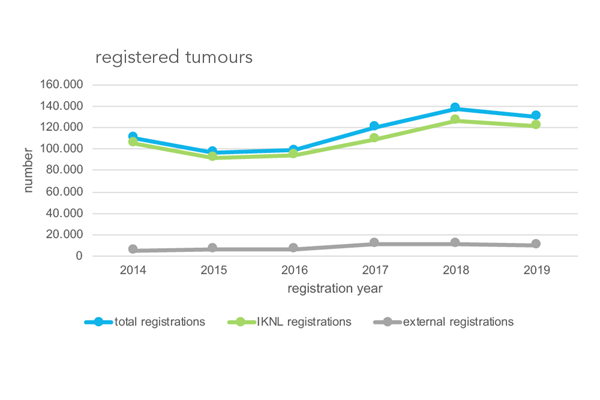
The rising number of cancer diagnoses is resulting in a heavier workload for the cancer registration. Data for squamous cell carcinomas of the skin and non-invasive anal tumours, however, are acquired automatically by electronic exchange from PALGA, the Dutch national pathology database. For other tumours automatic data linkage with PALGA support monitoring of new cancers, after which supplemental information from the Electronic Health Record (EHR) still has to be entered manually by the data managers. All data acquired for the NCR are verified and interpreted by experienced data managers to ensure that the information we provide to policymakers is complete, objective and independent.
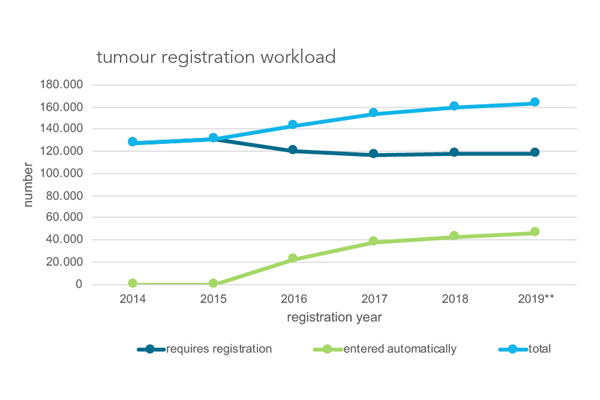
Clinical trial support
Clinical trials on new (combinations of) treatment options are a crucial step to offer cancer patients a better perspective. Our clinical trial office supports principal investigators and medical specialists to set up or conduct a clinical study. In 2019, 35 new clinical studies were initiated. Additionally, a total of 255 clinical studies were supported. These studies are in various phases, from start-up and patient inclusion to the follow-up ten years after inclusion. The number of studies that are open for inclusion has remained the same, which shows that our clinical trial office provides essential support to clinical studies at all hospitals in the Netherlands.
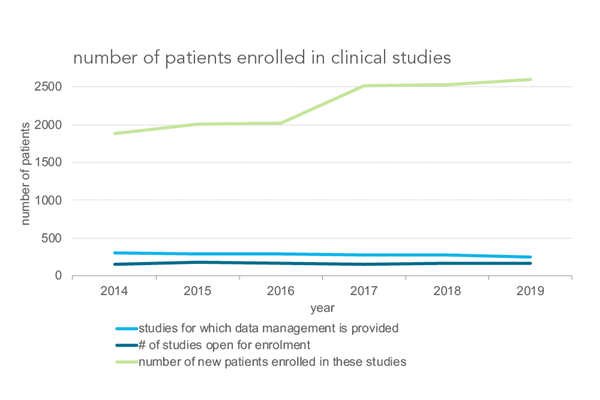
Access to NCR data
IKNL provides public access to population-based data via www.iknl.nl/nkr-cijfers (formerly cijfersoverkanker.nl). Healthcare professionals can access detailed NCR data at the hospital level and the level of regional oncology networks. Patients are given access to data via Kanker.nl, a website with reliable resources for patients that was created at the initiative of the Dutch Federation of Cancer patients (NFK), the Dutch Cancer Society (KWF Kankerbestrijding) and IKNL.
Data request
Researchers, clinicians and other interested parties can request (anonymised) data from the NCR for research purposes and for improvement initiatives in oncological and palliative care. The number of data requests has been on the rise since 2014. 488 data sets were supplied in 2019 after review by the scientific committee.
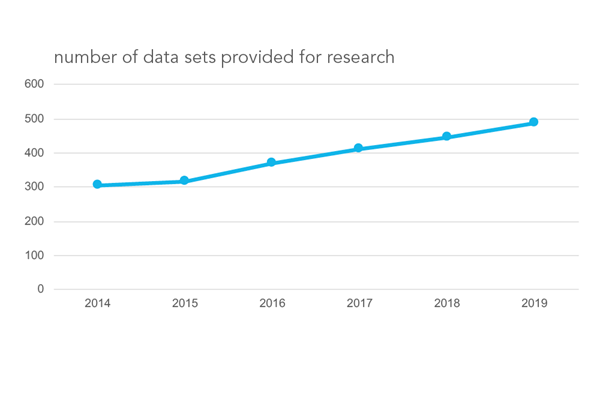
Scientific research for new insights
NCR data contributes to further improvement of prevention, oncologic and palliative care. Together with clinicians, we conduct scientific research to identify opportunities to improve treatment outcomes and/or patients’ experienced quality of live. In 2019, we published 226 scientific articles, 205 of which in peer-reviewed journals with a mean impact factor (IF) of 5.2. ‘Skin Cancer in the Netherlands’ is one of several reports that describe how patient care can be improved further.
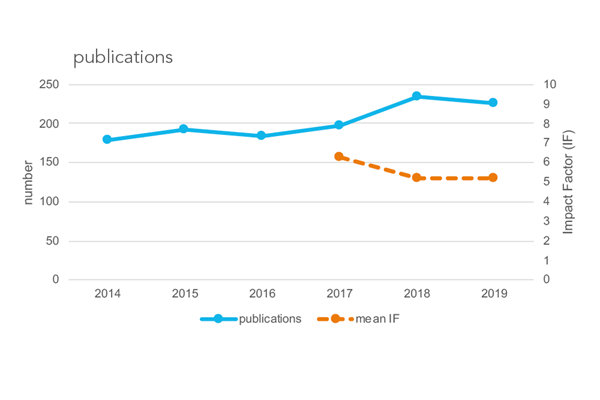
Supporting stakeholders
Network support
NCR data is the basis for tumour-specific regional care reports for Comprehensive Cancer Networks (CCNs) in the Netherlands. These data facilitate the discussion about health outcomes and referral between hospitals and provide an impetus to improve quality, create networks and establish cooperation agreements. Next to providing insights from data IKNL supports CCNs with the MDO2.0 project aimed at facilitating cooperation and the sharing of expertise in regional multidisciplinary team discussions.
IKNL assisted various guideline working groups in 2019 to complete their guideline updates, such as the breast cancer guideline and various gynaecology-oncology guidelines. These guidelines were provided in text format and as digital algorithms, which enables automatic evaluation with real world data from the NCR. As such guideline working groups can obtain insight from data they can use for continuous guideline improvement
Palliative care
IKNL also shares its expertise on registration, research, information and clinical practice support with the cooperative association Palliative Care Netherlands (PZNL). The first ‘Key Data Insight for Palliative Care’ were released in 2019. Additionally, the first nationwide study on palliative care in 40 hospitals for cancer patients has started. We also developed new guidelines for pain management and ileus, provided information about financing of palliative care, developed new support tools for clinical practice and organised training courses. All these activities contribute to the implementation of the Quality Framework for Palliative Care and can be accessed via the online platform for palliative care Palliaweb.nl.
In 2019 we assisted with the formation of palliative care networks which enable healthcare professionals to provide palliative care that is responsive to the values, preferences and needs of the patients and their loved ones. The number of PaTz groups (interdisciplinary consultation concerning palliative home care), where advance care planning for patients in the palliative phase is discussed in a timely manner, has grown (932 in 2019, 743 in 2018). The number of telephone consultations, where experts advise healthcare professionals on the treatment of patients in the palliative phase, has decreased somewhat since 2016. It is becoming more common to combine these with early discussions of the planning of the palliative care in PaTz groups or in multidisciplinary consultations with palliative teams in hospitals or transmural palliative care teams.
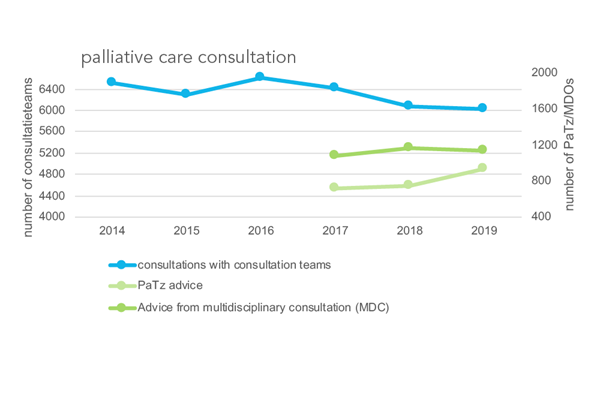
Please find the complete annual report in Dutch (pdf).
